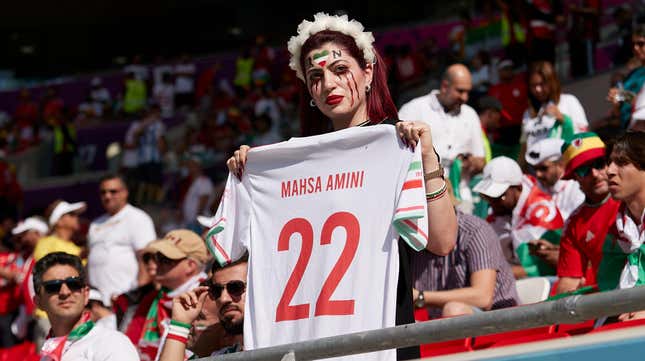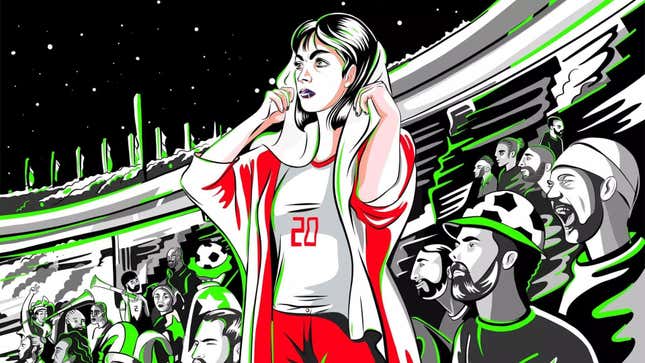‘Pink Card’ Explains How Soccer Became a Life-Or-Death Game for Women and Girls in Iran
Shima Oliaee, the host of the new podcast, tells the stories of the Iranian women who are fighting (and dying) for their freedom—inside and outside the stadium.
In Depth

Sahar Khodayari, a 29-year-old Iranian woman, grew up dreaming of watching a soccer match from inside Iran’s famed national stadium, Azadi Stadium. Iranian women have been banned from attending sporting events for roughly 40 years, but Khodayari was determined. In 2019, she attempted to sneak into the stadium.
Khodayari was quickly arrested and sentenced to six months in prison. On September 2 of that year, she set herself on fire as a political statement and died in a hospital the following week from severe burns. As international outrage surrounding her death spread online, Khodayari became known as Blue Girl: Blue is the color of her favorite team, Esteghlal.
Iranian “women made soccer their bull’s eye target,” Shima Oliaee, the host of the new ESPN 30 for 30 podcast, Pink Card, told Jezebel. Even after Blue Girls’ death, women are still fighting for access to that stadium: “Soccer and women’s rights in Iran [can] not be unbraided. They [are] a part of the same movement.”
Almost exactly three years later, and two months before the start of the Middle East’s first World Cup, Mahsa Amini, a 22-year-old Kurdish woman, died while in the custody of the country’s “morality police,” after she’d been detained for allegedly wearing her hijab improperly. The incident sparked a deadly, country-wide uprising that’s since turned into the biggest public demonstration against the regime since the 1979 Islamic Revolution. All the while, the Qatar World Cup—seething with global geopolitical implications, a rising body count, and an audience of billions of soccer fans—carried on in nearly complete silence.

But the legacy of Blue Girl and her contemporaries lives on. In Pink Card Oliaee, a Peabody and duPont Award-winning producer, tells the story of the Soccer Women: A group of women and girls spanning three generations who continue to fight for their right to watch soccer—and live freely—in Iran. The series features the voices of Iranian activists and writers, including Zeinab Sahafi, a young Iranian woman exiled for cross-dressing her way into stadiums. To enhance her disguise, she used ace bandages to strap down her breasts, stuffed a sock in her pants, cut off pieces of hair and glued them to her face, and muddied her fingernails. In her mind, the only way to access the stadium was to became a boy because, as Oliaee’s mother says, women and girls in Iran are “half of a man.” To this day, Sahafi still cannot return home.
For decades, Iranian girls and women have watched in horror as the regime does everything in its power to muzzle them—severing breasts and hands off of storefront mannequins to send a warning, and banning public singing, dancing, and, at one point, nail polish. But as the World Cup quietly comes to a close, their chants of “woman, life, freedom”—and their search for justice, bodily autonomy, and agency—only roar louder.
This interview has been edited for length and clarity.
Jezebel: I understand you started reporting this story nearly three years ago. Where did the first inkling of an idea come from?
Shima Oliaee: The striking thing about growing up in America as a child of Iranian immigrants was that I’d been given a lot of stereotypical images about what Iran was. One of the most predominant images was men screaming in the streets and chanting angrily, and I didn’t see Iranian women at all. In my own family, the women were so strong and powerful, and they were the most intimidating part of my childhood. Everyone’s scared of my grandma! As I was recording my last podcast series, I started asking my mother questions about her childhood in Iran, and she sounded like a broken record: She told the same stories over and over, and every single one of them was connected to soccer.
-

-

-

-

-

-

-

-

-

-

-

-

-

-

-

-

-

-

-

-

-

-

-

-

-

-

-

-

-

-

-

-

-

-

-

-

-

-

-

-








































